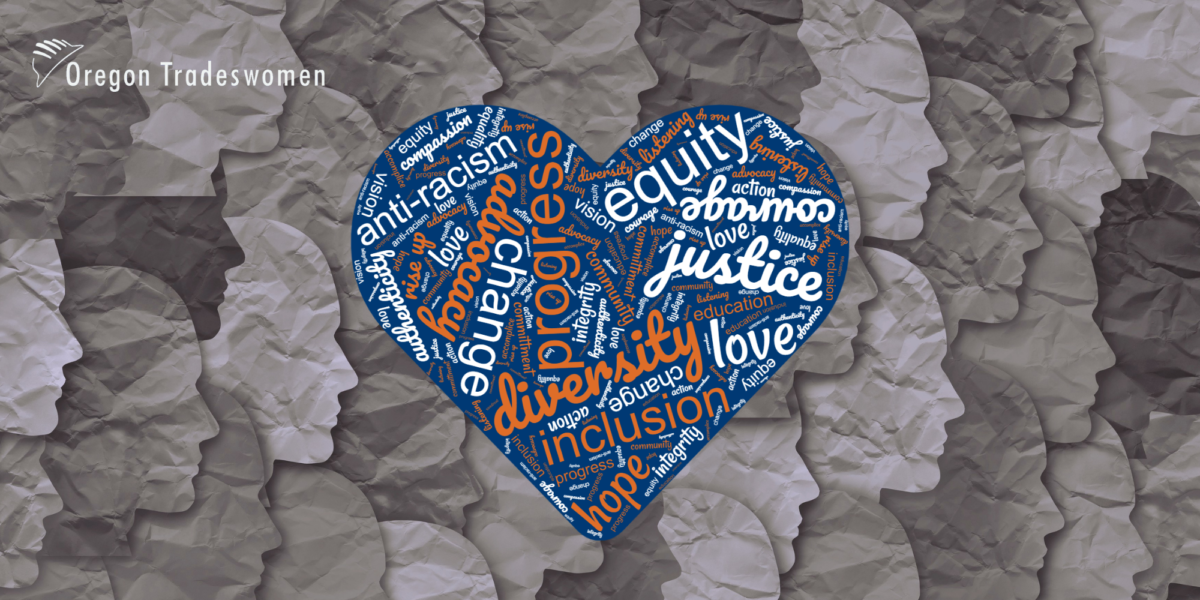Honoring Black History Every Day

As we celebrate and honor Black History month, I am reminded of the words of my former colleague from my time working at Chicago Women in Trades, a sister organization of Oregon Tradeswomen, who so powerfully speaks to the notion that Black History is only to be celebrated during one month of the year. She reminds me that Black History is made every day. And every day, being Black in America is both a celebration and a burden because racism and bigotry continue to exist, and our society continues to define humanity in the words of Audre Lorde as “white and male, for starters.” While Oregon Tradeswomen centers our work in equity, there is much more we are called to do.
As a white person in a nonprofit leadership role, I am trying to learn and unlearn every day.
Sometimes this work seems so heavy, so incredibly impossible, that it is hard to know what we can possibly do to change things. But, when these moments come, I am reminded that change does indeed happen, and we have to continue to hope and believe that together, we can make a difference. In this work with each of you, which I am incredibly grateful to be part of, I believe we will.
Yet, it is not enough to simply hope for change. It is not nearly enough to only have a Diversity, Equity, and Inclusion plan. It is not nearly enough to have an annual training for staff and board. We need to do more to ‘lean in’ to hard conversations and to question the status quo. While these efforts are part of the work, if we are going to affect real change and make equity more than just a buzzword, we must actively work to change systems of oppression and dismantle centuries of white supremacy. Racism is so deeply engrained in our society that often, well-intentioned white people (including myself) are missing our own implicit biases and failing to move from allyship to becoming accomplices in the fight for justice.
Moving from ally to accomplice means that we as individuals, as well as nonprofits, must not only embrace intersectionality, and examine how race, ethnicity, class, and gender have shaped the experiences of Black, Indigenous, and other people of color in our country – but, we must make an intentional shift to action. Action to move from “not racist” to actively antiracist.
Author and historian, Ibram X. Kendi, defines the transformative concept of antiracism, which he says will “help us more clearly recognize, take responsibility for, and reject prejudices in our public policies, workplaces, and personal beliefs.” Kendi says we can learn how to actively use this awareness to uproot injustice and inequality in the world – and replace it with love while taking action.
Action in our program work, our public policy platform, and our partnerships with community and industry. Action in dedicating fundraising for Oregon Tradeswomen’s Helen Getchell Women of Color Fund, established to help address barriers and increase retention for Black, Indigenous, and other women of color in the trades. Taking action to change the culture of the construction industry and our jobsites in partnership with industry and community through the regional Safe from Hate Alliance. Action in working to uphold the Safe from Hate Jobsite Culture Pledge through partnering with Professional Business Development Group to launch RISE Up Oregon, a culture change program designed specifically for the construction trades. It’s also about making changes and taking action in our internal agency, and in our policies and practices as a nonprofit so that we are not simply talking about equity but working to live it as a value each and every day as we become actively antiracist.
In her 2000 work, the national bestseller “All About Love,” Black feminist, scholar, and activist bell hooks speaks to community and social justice values as “living by a Love Ethic,” in which she says that the antidote to domination is a love ethic. She writes, “Domination cannot exist in any situation where love ethic prevails… All the great social movements for freedom and justice in our society have promoted a love ethic.” hooks reminds us that living such values and realizing a “Love Ethic” requires courage and commitment, further noting that one of the very challenges to a love ethic is “a refusal to stand up for what you believe in.”
This month, and every month, Oregon Tradeswomen is celebrating Black History, and working to stand up for what we believe in. We are working to take action. We are working to live by a love ethic, and in the words of Ibram X. Kendi, we will work to uproot injustice and inequality in the world — and replace it with love while taking action.
I’m in. I hope you are too.
In solidarity & gratitude & love,

Kelly Kupcak
Executive Director
kelly@oregontradeswomen.org